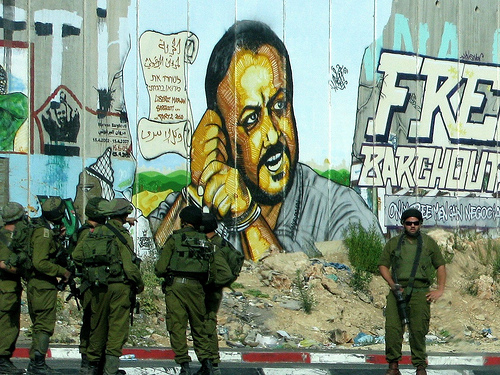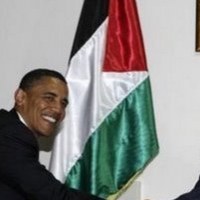![]()
Thu, Sept 01, 2011 | Rubin Reports | By Barry Rubin

Marwan Barghouti, head of the Tanzim terror group and founder of the al-Aqsa Martyrs’ Brigade, has said that a US veto of a unilateral Palestinian statehood proposal at the UN would be tantamount to "terrorism". Marwan Barghouti is serving five life sentences in Israeli prison for his involvement in three terrorist attacks in Israel, attempted murder, membership in a terror organization and conspiring to commit a crime. (Photo: Graffiti of Marwan Barghouti on a wall near Jerusalem; Begemot, Flickr)
Why Supporting Unilateral Palestinian Independence Is A Deadly Mistake
This article is originally published in the Ottawa Citizen. © Copyright (c) The Ottawa Citizen. It’s reprinted here with permission by the author.
Marwan Barghouti, under a life sentence in an Israel prison, has said that if the United States vetoes a unilateral Palestinian statehood proposal at the UN, there will be massive riots. To underline the point, he called such a decision a “historic, deadly mistake.”
When he says, “deadly,” he means it. Indeed, Barghouti, the leader of the Fatah grassroots’ (Tanzim) organization on the West Bank, is in prison precisely because he organized massive deadly riots after the Palestinian Authority (PA) rejected a compromise peace with Israel that would have given them a state in 2000. In other words, they’re intransigent and then start a war when they don’t get everything they want.
It’s the basic tactic in the terrorist playbook: Give me everything I want so I can better destroy you in the long run or I will kill you in the short-run.
And it is encouraged by the basic tactic often used by Western governments: We feel your pain, understand that you are a victim, and will give you as much as possible. Those concessions are rejected and then more are demanded.
This doesn’t make sense to most Western observers: Aren’t the Palestinians desperate for a state and to end a terrible “occupation?” In fact, though, Israel pulled completely out of the Gaza Strip six years ago this month and the Palestinian Authority (PA) has now governed almost all West Bank Palestinians for the last 17 years.
In fact, the PA is not in a hurry to negotiate a deal for several reasons.
First, the moderates in the PA are very weak compared to the radicals who still run Fatah, its ruling party. Second, the PA is still competing with revolutionary Islamist Hamas, which rules the Gaza Strip in a race to prove its militancy. Third, almost nothing has been done to prepare the Palestinians for a compromise peace and two-state solution alongside Israel. Finally, most Palestinian leaders still think that total victory and Israel’s extinction is possible, desirable, and just. Many in the West — whether intentionally or not — encourage that last belief by hostile policies and beliefs regarding Israel.
That doesn’t mean Israel is willing to give everything or that its policies are perfect. But the mood in Israel today, and for the last dozen years or more, is ready — even eager — for a lasting, stable two-state solution. The differences over borders and other issues can be argued at the negotiating table and are possible to resolve in a genuine exchange of compromises and concessions on both sides.
But since 1993, the Palestinian Authority has made several agreements with Israel. In exchange for being handed control over the Gaza Strip and much of the West Bank; billions of dollars in aid; the supply of weapons; the return of tens of thousands of Palestinians to these territories; and many other benefits, the PA promised to do various things in return. These include an end to incitement to kill Israelis; stopping terrorism; and negotiating in good faith for a comprehensive agreement.
Since Hamas attacked Israel with rockets and mortars setting off a war in December 2008, the PA has refused to negotiate with Israel. When President Barack Obama in September 2009, announced he wanted to hold direct talks in Washington, the PA refused. In 2010, when Israel, at the request of President Barack Obama, froze all construction on settlements for nine months, the PA again wouldn’t talk.
Instead, the PA came up with a new strategy, why negotiate a compromise agreement with Israel when it could go to the UN and be handed an independent state without having to make any concessions? No need to reach a deal with Israel over borders, refugees, east Jerusalem, security guarantees, agreeing that the conflict is completely finished, or recognizing Israel as a “Jewish state” (the Palestinian constitution says that Palestine will be an Arab and Muslim state), just get a vote in the General Assembly!
This, of course, is not a solution to the conflict but a way of avoiding a negotiated solution to the issue. It is not a way to end the conflict but to ensure that the conflict continues and more lives are lost on both sides.
The underlying problem is that the PA and its allies among Arab and Muslim-majority states want to wipe Israel off the map. If they want a Palestinian state on the basis of an agreement with Israel that goal could be accomplished within months. But because such a peace arrangement would block the advance toward the ultimate goal it is undesirable.
But suppose that the UN did agree to recognize Palestine as a state, meaning that the Security Council approved and the General Assembly voted to do that? Immediately, the state of Palestine would have no incentive to reach a deal with Israel. Instead, it could do things like trying to import weapons from abroad; allow Arab armies to send forces onto its soil, and even allow cross-border terrorist attacks on Israel. In the Gaza Strip, Hamas, a terrorist group that openly calls for genocide against Israel and all Jews, would be in effect part of an internationally recognized government.
If Israel then responded to any attack, the state of Palestine would go to the UN, declare Israel to be the unprovoked aggressor, and the automatic majority in the General Assembly would back it up no matter what the facts. The possibility of real negotiations, much less a peace treaty, would be set back for years. And in a region increasingly heading toward revolutionary Islamism in many places, a deteriorating security situation overall plus this new development would bring war.
Far from helping the situation, then, the UN gambit is likely to lead to less peace, no hope of a negotiated settlement, and more bloodshed.
About the author,
Barry Rubin is director of the Global Research in International Affairs (GLORIA) Center, editor of the Middle East Review of International Affairs (MERIA) Journal, and Middle East editor and featured columnist at PajamasMedia http://pajamasmedia.com/barryrubin/. His latest books are The Israel-Arab Reader (seventh edition), The Long War for Freedom: The Arab Struggle for Democracy in the Middle East (Wiley), and The Truth About Syria (Palgrave-Macmillan). GLORIA Center site is http://www.gloria-center.org.His articles published originally outside of PajamasMedia are at http://www.rubinreports.blogspot.com.



 RSS
RSS











Why Supporting Unilateral Palestinian Independence Is A Deadly Mistake | Middle East news, articles, http://t.co/iN3Habx
Why Supporting Unilateral Palestinian Independence Is A Deadly Mistake | Middle East news, articles, http://t.co/iN3Habx